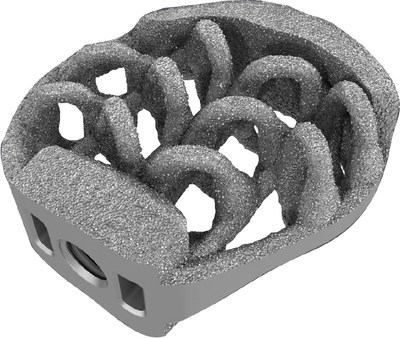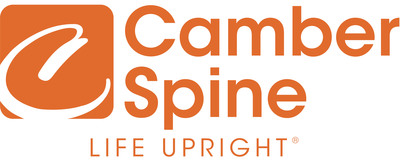

KING OF PRUSSIA, Pa., Sept. 12, 2019 /PRNewswire/ -- Camber Spine, a leading innovator in spine and medical device technologies, announced the launch of its first spinal implant designed and manufactured specifically for the oblique lumbar interbody fusion (OLIF) spine surgical procedure. This implant represents the fifth product in its distinctive, rapidly growing SPIRA® device family. This implant, the proprietary SPIRA®-O Open Matrix OLIF, is a unique interbody fusion implant embedding spiral support arches and Surface by Design™ technology.

The SPIRA®-O Open Matrix OLIF is the only system on the market designed specifically for the OLIF spinal surgery approach. The device was designed to take advantage of the natural corridor for an oblique surgical approach, anterior to the psoas muscle, which is performed while the patient is in a lateral position. The OLIF approach gives surgeons the ability to access multiple levels through one incision without having to reposition the patient and offers good disc space visualization. Furthermore, the incision for the OLIF approach spares the abdominal muscles and allows gravity to aid in retraction. SPIRA®-O is designed with implant configurations, lordotic angles and associated instruments to access all levels of the lumbar spine. The SPIRA®-O also incorporates Camber Spine's proprietary technology Surface by Design® and its patented arch design for redistribution of load to maximize end plate contact and promote osseointegration.
"In collaboration with the rest of the design team, we set out with the goal to create an implant and associated instrumentation to perform a minimally invasive procedure that could restore complex lumbar deformity and sagittal alignment issues in our patients", stated Dr. John Peloza, one of the first surgeons to implant SPIRA®-O. "We concluded that by utilizing the oblique lateral anterior to psoas natural corridor, we could create an implant and inserter that successfully eliminated the complexities of the orthogonal maneuvers associated with other systems. We have successfully proven this concept in our patients."
The OLIF approach, which is grouped at times with the lateral or extreme lateral (LLIF/XLIF) approach, is a procedural approach in its own right that is gaining significant traction and increasing usage as physicians train in this approach. Due to its significant procedural advantages, the OLIF approach has projected procedure and market value growth over the next several years which is significantly greater than that of established approaches such as anterior, lateral, and posterior. Camber Spine is very well positioned to be at the forefront of the faster-growth, exciting OLIF component of the interbody fusion market.
"With the anterior to psoas implant addition to the SPIRA® family, Camber Spine continues to strengthen its position in the 3D printed open architecture spinal fusion marketplace" said Daniel A. Pontecorvo, CEO. "This technology combined with advances in minimally invasive surgical approaches and navigation assisted surgery is increasing treatment options for complex pathologies. We believe that our patented SPIRA technology platform with its open matrix design comprised of a series of spiral arches 3D-printed with a deliberately designed roughened surface will encourage faster fusions ultimately leading to improved patient outcomes. Camber Spine is committed to providing safe and effective spine solutions for our patients that are supported by clinical research. Towards that end, we have several studies underway to demonstrate what we believe are the significant advantages of SPIRA® cages over other cage materials and designs."
Camber Spine is showcasing SPIRA®-O at the 2019 Meeting of the North American Spine Society in Chicago, IL on September 25th – 27th. John Peloza, MD of The Center for Spine Care in Dallas, Texas will be leading discussions and demos of SPIRA®-O at the Camber booth (# 3430) on September 25th from 10:00 – 11:30 A.M. and September 26th from 1:00 – 2:30 P.M. Dr. Peloza, an early adopter of the minimally invasive surgery (MIS) treatment philosophy, has spent decades on the forefront of the evolving field pursuing one mission: providing safe, predictable treatments to his patients.


SOURCE Camber Spine
